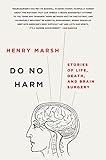Select newly added library titles. A full list of new titles can be found online.
Do no harm: stories of life, death, and brain surgery, by Henry Marsh. “Neurosurgeon Henry Marsh reveals the fierce joy of operating, the profoundly moving triumphs, the harrowing disasters, the haunting regrets, and the moments of black humor that characterize a brain surgeon’s life. If you believe that brain surgery is a precise and exquisite craft, practiced by calm and detached surgeons, this … brutally honest account will make you think again”–Amazon.com. “Neurosurgeon Henry Marsh reveals the fierce joy of operating, the profoundly moving triumphs, the harrowing disasters, the haunting regrets, and the moments of black humor that characterize a brain surgeon’s life. If you believe that brain surgery is a precise and exquisite craft, practiced by calm and detached surgeons, this … brutally honest account will make you think again”–Amazon.com. |
WL368 M365 2015 |
Guiding with Care-AI: A practical framework for facilitating AI conversations in health professions education, by Janet Corral, et al. “The Care-AI Scenarios Workbook is an invitation to shape not just what AI does, but how it’s done, and who it’s done for. Through 10 real-world scenarios and a research-informed ethical framework, this guide supports critical reflection, meaningful dialogue, and action that aligns with your values.”– Back cover “The Care-AI Scenarios Workbook is an invitation to shape not just what AI does, but how it’s done, and who it’s done for. Through 10 real-world scenarios and a research-informed ethical framework, this guide supports critical reflection, meaningful dialogue, and action that aligns with your values.”– Back cover |
W18.2 C823 2025 |
Qualitative inquiry & research design: choosing among five approaches, by John W. Creswell and Cheryl N. Poth. “The ideal introduction to qualitative research’s theories, strategies, and practices, Creswell and Poth’s Qualitative Inquiry and Research Design explores five qualitative research approaches: narrative research, phenomenology, grounded theory, ethnography, and case study. Packed with updated content and examples, this Fifth Edition guides readers to select the best qualitative approach for their studies.” — excerpt from Amazon.com “The ideal introduction to qualitative research’s theories, strategies, and practices, Creswell and Poth’s Qualitative Inquiry and Research Design explores five qualitative research approaches: narrative research, phenomenology, grounded theory, ethnography, and case study. Packed with updated content and examples, this Fifth Edition guides readers to select the best qualitative approach for their studies.” — excerpt from Amazon.com |
H62 C73 2025 |
The psychology and science of pseudoscience, by NYMC author: Terence Hines. “This book provides a comprehensive review of numerous areas of pseudoscience and related pathological science. It not only describes the factual bases for rejecting pseudoscientific claims, but also emphasizes the psychological processes that lead to the acceptance of such claims. This book is timely, given the increase in misinformation over the past decade. Using three principles of cognitive psychology, this book helps explain why people are hard-wired to accept and continue to believe in pseudoscientific claims. It provides up-to-date discussions of numerous paranormal and pseudoscientific topics, including the usual suspects-UFOs and alien abductions, astrology, cryptozoology, and more-but also belief in conspiracy theories, laboratory parapsychology, bogus forensic science techniques, the pseudopsychologies of Freud, medical fraud, and the unethical practices of Big Pharma. Older research that was foundational in the critical examination of several topics is woven throughout to situate them in a historical context..” — excerpt from Amazon.com “This book provides a comprehensive review of numerous areas of pseudoscience and related pathological science. It not only describes the factual bases for rejecting pseudoscientific claims, but also emphasizes the psychological processes that lead to the acceptance of such claims. This book is timely, given the increase in misinformation over the past decade. Using three principles of cognitive psychology, this book helps explain why people are hard-wired to accept and continue to believe in pseudoscientific claims. It provides up-to-date discussions of numerous paranormal and pseudoscientific topics, including the usual suspects-UFOs and alien abductions, astrology, cryptozoology, and more-but also belief in conspiracy theories, laboratory parapsychology, bogus forensic science techniques, the pseudopsychologies of Freud, medical fraud, and the unethical practices of Big Pharma. Older research that was foundational in the critical examination of several topics is woven throughout to situate them in a historical context..” — excerpt from Amazon.com |
BF311 H486 2025 |
